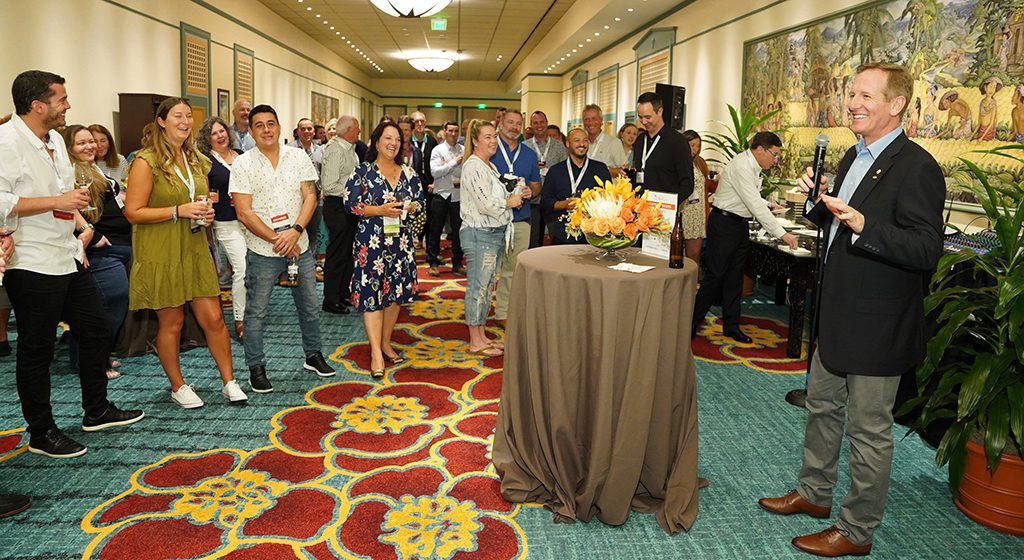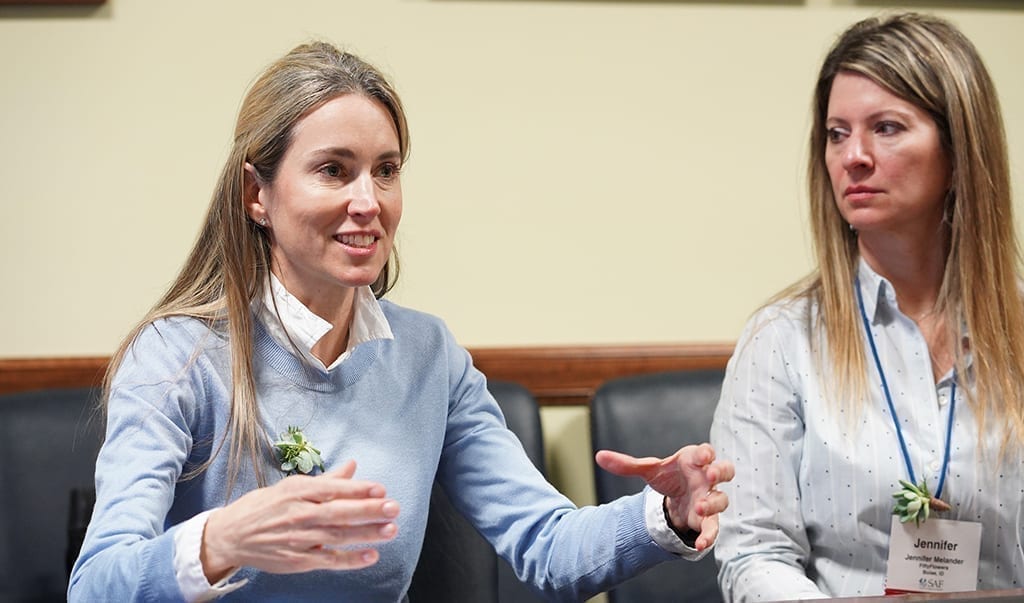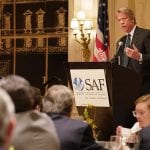
Chris Drummond, AAF, PFCI, chairman of the Society of American Florists’ Executive Committee, thanks donors during a SAFPAC fundraiser at SAF Orlando 2021. The fundraiser brought in $35,050, which will be used to advance legislative issues important to the floral industry.
The results are in: SAFPAC’s annual fundraiser tallied a record-setting $35,050 in contributions and pledges at SAF Orlando 2021. Twenty SAF members contributed $1,000 or more — an all-time high for the Gold Club contribution level.
SAF’s advocacy wins over the past year and a half — including adding roses to the Generalized System of Preferences (GSP) and securing floriculture growers access to aid through the USDA — played a role in driving enthusiasm for SAFPAC, resulting in the wave of contributions.
Martin Meskers, AAF, CEO of Oregon Flowers in Aurora, Oregon and a SAFPAC Gold Club contributor, received USDA aid via the Coronavirus Food Assistance Program 2 (CFAP 2) and called SAF’s advocacy work a “game changer” for some growers when they faced increased costs — and losses — due to the pandemic.
“If it wasn’t for SAF, we never would have gotten aid from the USDA. It would have never happened if SAF hadn’t started the process,” he says. “Look at what SAF did with helping members through COVID. Without them, we’d all still be sitting here trying to do it on our own.”
SAFPAC stands alone in advocating for the industry across segments, notes Chris Drummond, AAF, PFCI, of Penny’s by Plaza Flowers in Philadelphia and chairman of SAF’s board of directors, “No one else speaks on behalf of the entire industry on Capitol Hill,” says Drummond, a SAFPAC Gold Club contributor. “A strong SAFPAC is critical to SAF’s advocacy work on issues important to growers, retailers and wholesalers alike.”
SAF focuses its contributions on members of Congress who influence the industry’s top legislative and regulatory priorities. In recent years, SAF has contributed to members of the House and Senate Agricultural Appropriations committees because of their role determining floriculture research funding. Members of the Ways and Means Committee are also key targets, given the committee’s jurisdiction over issues related to trade, taxes and GSP.
“We have focused our SAFPAC contributions on members who serve on these committees, as well as the Agriculture Committee in the House and Senate where SAF has a long history of relationships,” says SAF Senior Lobbyist Joe Bischoff. “Why? It has helped strengthen our relationships with these members and has given us more opportunities to highlight the societal and economic benefits of flowers and SAF’s policy positions.”
The new influx of funding stabilizes SAFPAC, which had dwindled to less than $5,000 during the pandemic. It also enables SAF’s lobbying team and CEO Kate Penn to get to know members of Congress and their staffs better, and have more participation in the 2021-2022 election season.
“Meeting with members and their staffs on the Hill are just that — meetings,” says Bischoff. “But if you do those Hill meetings coupled with PAC contributions and PAC events, it helps cement the overall relationship with a Congressional office.”
SAF remains focused on legislative issues that will affect the industry, such as the potential impact of tax change proposals on small business, advocating for retroactive reinstatement of GSP and working with the USDA to analyze impacts on new pesticide regulations —an ambitious agenda that will require continued growth of SAFPAC.
“We’re excited about the renewed enthusiasm for supporting SAFPAC — but we still have more work to do to build the PAC up to the level we need it to be in order to continue to pursue all of our legislative priorities,” Bischoff says.
Want to learn more about SAFPAC? The first step is signing a prior approval form online. This allows SAF to communicate with you about what SAFPAC is doing and alert you to future SAFPAC events. This permission is required by law. Questions? Contact Katie Butler.
Katie Butler is the senior vice president of the Society of American Florists.



